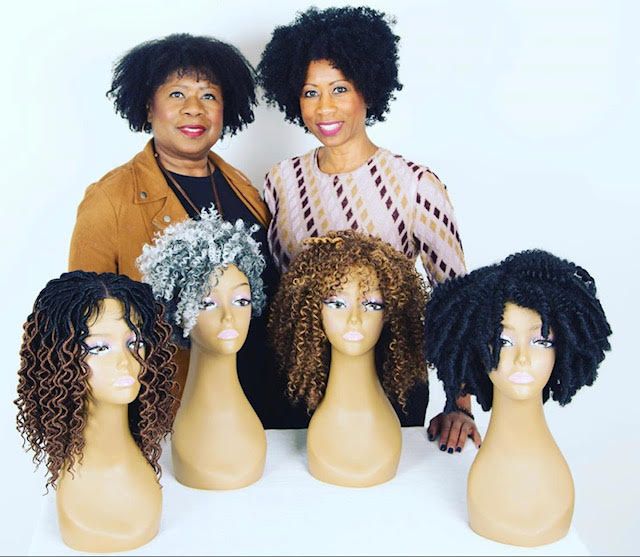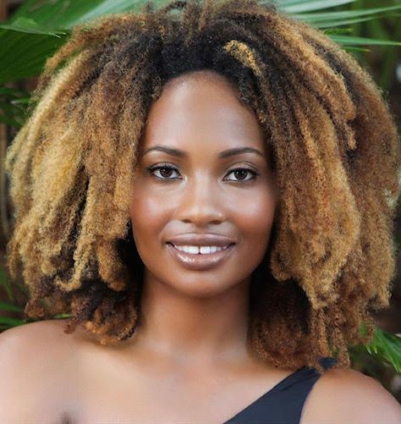Black hair is complex. It’s tied to our identity and our history, and is often the first thing that’s noticed, admired, and judged about us.
For Black women battling cancer, losing their hair can take on more layers than our white counterparts.
And for Dianne Austin, a cancer survivor and women of color, the process of losing her hair and not finding a wig that matched her 3b to 4c coily texture added yet another layer of difficulty.
“When I went to the hospital, I was being treated at to get a wig, I realized they didn’t have any coily or curly wig styles,” she tells ELLE.com.
“I went to some other major hospitals in the Boston area and found that those hospitals and boutiques didn’t carry wigs that looked like my hair at all. It was all just straight wigs or wavy wigs.”
Instead of getting frustrated or settling for a straight wig, Austin went to work.
Alongside natural hair blogger Pamela Shaddock, the duo started Coils To Locs, a medical wig resource for women of color looking for our hair patterns represented—kinky, coily, braided, and locs.
Below, Austin opens up about how the business came about, the healthcare disparities for women of color, and how the wig is more than just a wig for cancer patients.
What inspired you to come up with Coils To Locs?
The business is actually based on my experience as a cancer patient. I'm a breast cancer survivor in remission.
During the process of learning that I was diagnosed with cancer in 2015, I learned that I would be losing all of my hair and be given a wig subscription.
My oncologist told me that I could go to any cancer center boutique with my wig prescription and get a wig. My health insurance would cover the cost of wig prescriptions.
Do you see the lack of wigs for women of color as a healthcare disparity?
It's a healthcare disparity for a number of reasons.
One, if you are fortunate enough, as I am, to have really good health insurance that covers the cost of these medical wigs and then to not be able to use your wig, just because these hospitals are not meeting your needs as a patient—that's a disparity.
You have a population of patients who cannot get products that you are technically making available for all patients. I was denied the opportunity to use my health insurance.
As a Black women, I know that there are a multitude of things that we'd like to do with our natural hair. How did you decide on the styles of Black hair you feature?
We really are trying to stay on top of the trends in a number of ways. We ask for opinions around the styles and feedback from clients.
And then we just watch what’s going on in the social media sphere. We're constantly watching videos and on Pinterest and all the places where there is a really strong natural hair care movement to see what the trends are right now.
We're still trying to find a really quality rated wig that doesn't require glue. We have a few samples and we're testing them right now.
We do have some braided wigs that we could roll out that we’re still working on, but we do have a couple of loc styles that we want to roll out soon.
One of the messages on your site says, “We are more than just wig.” What inspired that thinking?
We want people to understand that a wig isn't a vanity purchase for many women. Losing your hair for medical reasons or for any reason affects people.
You have traction alopecia or whatever it is, which can be very traumatic, and a wig allows you to maintain your sense of dignity, your sense of self when you're going through a very difficult process like chemotherapy.
It allows you to look in the mirror and have a feeling of control over your life, because the disease and the treatment takes away so much from you. It's so debilitating to go through chemo. It's so archaic to me.
"We want people to understand that a wig isn't a vanity purchase for many women."
I often say to people, I'm hoping 25 years from now, people will look back and say, that process is so barbaric. Putting chemicals in and killing all the cells, good cells and bad cells, in order to save someone's life. But when you go through that process, there were times when I couldn't walk two feet without having to sit down. In one case, I laid down on the floor because I just couldn't take another step.
I mentioned all the hair loss—you lose your lashes, your brows—but your nails can also blacken and fall off. In my case, not all the nails. But when I say blacken, I mean black nails.
The soles of hands and feet turn really, really dark, like gray. My skin started graying, it doesn't look like it does now. There's so many things happening with this chemotherapy process.
And to be able to have some control over the way you look and maintain your dignity and sense of self is what makes these wigs more than just a wig. It's not just because someone wants to cover up their bald scalp.
It's not important. And so this brings me to the investor process, where I've been at many networking events and I've done pitches and things like that where people have actually said, “Well, it's just a wig, what’s the big deal?” or “Can't they just go and get a wig somewhere?” No.
How can we support the brand?
Awareness! We've been trying to get into a conversation with the American Cancer Society for quite a while.
We've had some difficulty in making connections. To be quite honest, I'm hoping that interviews like this may help open those doors.
In regards to giveback, one of the things that Pamela and I have talked about is, it's really hard oftentimes if you're going through cancer and going through treatments to meet life’s other demands.
You may need help with transportation. You may need help with daycare. You may need food delivered.
We are wondering if there are ways that we can give back when we get to the point where we're able to do that, which quite frankly, we're hoping it will be in the next 12 months because that's important.
What do you think is next for Coils To Locs?
We want to control the production of wigs as opposed to sourcing overseas, which is what we're doing now.
We want to bring jobs to the U.S. We want to control the manufacturing because women, Black women in particular, we are spending billions of dollars in the Black hair care industry, but we don't own most of the businesses that are making these billions of dollars and we want to change that dynamic.
We would love to be able to explore. For example, technology. Are there wigs that are currently made by hand with a sewing machine?
We also want to produce Black mannequin heads because the mannequin heads that exist now have Caucasian features and are painted brown.
We would also like to do some research around creating wigs for children and men, because there's a definite gap in that market as well.
And the other important thing that we love to be able to do in the next 12 months is add augmented reality to our websites so that people can try the wigs on virtually. Those are all on our list of things that we really want to accomplish.

This interview was edited for clarity and length.
Latest Stories
-
2024 WAFCON: Ghana drawn against defending champions South Africa in Group C
25 mins -
Photos from DW-JoyNews street debate on ‘galamsey’
1 hour -
Mimmy Yeboah: Blending heritage with global sophistication, confidence redefined through couture
1 hour -
Akufo-Addo commissions 97-km Tema-Mpakadan railway line
2 hours -
Majority requests recall of Parliament
2 hours -
Kanzlsperger and Professor Quartey support WAFA with medical Donation
2 hours -
Gideon Boako donates 10 industrial sewing machines to Yamfo Technical Institute
2 hours -
‘Golden Boy’ Abdul Karim Razak honored at WAFU-B general assembly
3 hours -
Buipewura Jinapor secures Vice Presidential position in National House of Chiefs with record votes
3 hours -
2024 election: I want results to come out like ‘milk and honey’ – Toobu
3 hours -
Ghana’s Henry Bukari hands over chairmanship of ECOWAS Brown Card Council of Bureaux
3 hours -
Residents of Dome-Kwabenya on edge ahead of December elections
3 hours -
Moffy drops new single ‘Wo’, blending culture and modernity
4 hours -
Don’t bring soldiers to polling stations – Martin Kpebu
4 hours -
Ogyeahohuo Yaw Gyebi II retained as President of National House of Chiefs
4 hours

